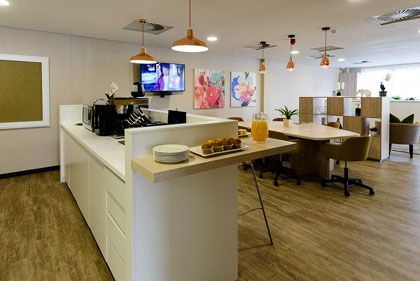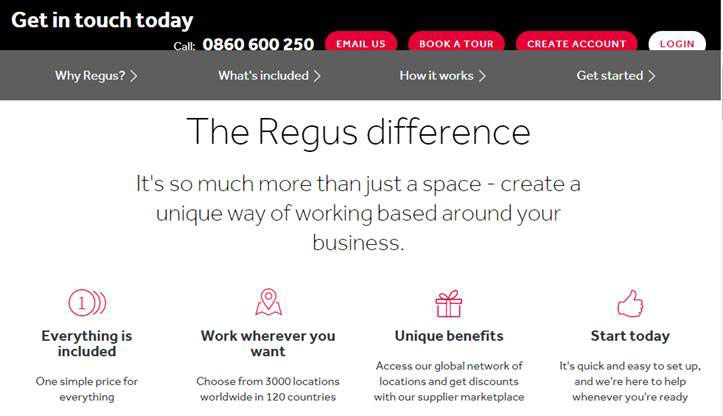Why the fuss over flexible working? Rapid urbanisation, technological breakthroughs, shifts in global economic power, resource scarcity and climate change are changing the way we work worldwide.* Businesses of today are increasingly faced with reasons to adapt and stay agile to track the ever-changing work landscape and protect their profits.
The effect of co-working on the business landscape according to the study is interesting. The commercial property world appears to be undergoing a structural change, with mobile workers making a significant proportion of expensive office space inefficient and obsolete. Fixed leasing arrangements are slowly being replaced with flexible work locations.
With more people working remotely at least part of the week, businesses of all sizes are faced with the option of paying for empty desk space or cutting down on permanent office space and opting for more flexible co-working spaces or temporary office solutions, reducing costs.
Technology has revolutionised the way we work compared to only a little more than six years ago. The Regus research, canvassing over 20 000 managers and business leaders worldwide, showed that 97 percent of South Africans surveyed had used Whatsapp for business in the past month. Before Whatsapp, the alternative would have been an email, a telephone call or walking to a colleague’s desk to ask a question. Instant messaging is replacing the need for these interactions and it’s free.
Slow and unreliable internet connections seem to be the biggest obstacles for South Africans trying to work remotely from home, with 33 percent of people (the highest worldwide) unable to do so for this reason. The current state of internet accessibility is worrying, although Government plans to have fibre cables in place throughout South Africa by 2020.
We are not alone, though. 84 Percent of global respondents stated that access to fast Wi-Fi affected their ability to work remotely most of all. This is about 50 percent more than those who stated that owning a tablet computer was a necessity to work remotely.
The rise of online flexible work tools such as Dropbox, Google Drive and Video Conferencing is another reason it has become easier to work remotely. In a 2015 Regus survey, Dropbox was used by 56 percent of remote workers, but a year later it had risen to 63 percent. Over 90 percent of South Africans surveyed believed that remote working was driving the growth of ‘Cloud’ applications used to share and securely store documents and files.
Surprisingly, the research showed that between 60 and 65 percent of South Africans stated that they were already working outside of the office for 2.5 days or more a week. This is higher than the global average of 54 percent. Of those working remotely from areas other than their homes, the percentage working at coffee shops was slightly higher than those working at business centres.
The benefits of remote working for South Africans and their global counterparts ranged from a shorter commute, increased productivity (74 percent), improved work-life balance, meeting new consultants and partners, help accessing office and tech equipment and helping them concentrate.
This contrasts with the 40 percent of those surveyed worldwide who found household noises too distracting to work from home. One in ten also regard the financial cost of setting up a home office and running it as an obstacle. The golden medium seems to be working outside, but closer to the home to keep the benefits of short commute, family life and work-life balance.
An important benefit of businesses offering remote and flexible working options is also the attraction and retention of talent. Workers are reporting that it is about more than the salary these days. Factors such as greater work-life balance and happiness proved to trump a stellar salary in many cases.
In South Africa, specifically (and in 3,000 locations worldwide), Regus has met the growing needs of remote workers and businesses to work in high-technology, co-working spaces, flexible working environments, office and meeting spaces on-demand or on contract. With 58 locations in South Africa, and Paarl, Pietermaritzburg and Bloemfontein being the latest, there is also a growing number of freelancers, SME’s, contractors and consultants making use of the professional facilities nearest to them instead of commuting.
Over the next decade the South African workforce is set to radically change. A growing number of flexible types of workers such as freelancers, contractors and part-time workers will reduce the demand for large fixed office locations and will instead drive the demand for small, flexible office leasing arrangements, business lounges, co-working spaces and professional meeting rooms.
Businesses need to be future-proofed for these changes so they are able to embrace agile work trends and manage growth efficiently.
About Regus
Regus is the leading global workspace provider. We have built an unparalleled network of office, co-working and meeting spaces for companies to use in every city in the world. It’s an infrastructure to support every business opportunity - a global infrastructure built for businesses.
Our network of workspaces enables businesses to operate anywhere, without the need for set-up costs or capital investment. It provides our customers with immediate cost benefits and the opportunity to fully outsource their office portfolio.
It’s a network designed to enhance productivity and connect 1.5 million like-minded professionals: an instant global community, and a place to belong.
Our network of office, co-working and meeting spaces covers 3,000 locations in over 1,000 cities and over 100 countries, and serves 1.5 million members every month.
*PWC Workforce of the future - https://www.pwc.com/gx/en/services/people-organisation/workforce-of-the-future/workforce-of-the-future-the-competing-forces-shaping-2030-pwc.pdf













































